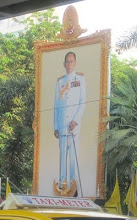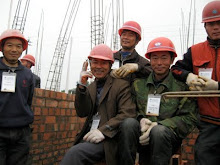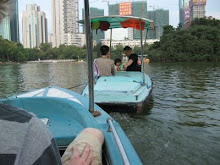We have now been in Hong Kong for almost 2 months and I have yet to write anything about why I came here in the first place. Actually, I am still trying to figure that out, but my understanding of it does deepen as the weeks go by.
In a nutshell, Hong Kong has decided to transform its education system by lopping a year off high school and adding a year onto university, changing the latter from three to four years. Another way to look at it would be to say they are switching from a British to a US program. I had assumed that switch reflected the world's realpolitik. It seems that the US has as much influence in Hong Kong now as the UK. And then of course, the major influence on Hong Kong, i.e. the country of which it is a part, China, sends its students to college for four years.
It turns out that the decision was a little more rationally based. Hong Kong students have always scored very well on tests of quantitative ability; in fact they put the US to shame. In addition, in the international survey of universities published by the Times Higher Education Supplement last week, Hong Kong placed 5 in the top 200, led by Hong Kong University at #24. Even my institution, Hong Kong Polytechnic University, squeaked in at #195. UConn did not make the list. These league tables are always a little peculiar, with a large component based on subjective assessments, I think in this case of college presidents. However despite this rosy picture, when local employers were surveyed, they said that they would much rather hire graduates of US or European universities than those from Hong Kong institutions. Although Hong Kong graduates knew a lot, their ability to think critically and creatively and adapt to changing situations was limited. Since the opinions of local employers are very important in this capital of commerce, these surveys were taken very seriously, hence the wholesale changes that are now being undertaken.
Universities here are increasing their curriculum by one third. They have also been encouraged to do so not simply by adding a year at the beginning, but rather to rethink the entire undergraduate programs. Of course, the extent to which they are truly doing this is questionable, but that is the idea. It is an enormous, courageous and exciting undertaking. It would never happen in the US, where the system is too big and too decentralized. But here there are 8 publicly funded universities and so such changes can be mandated.
After the changes were announced, a Hong Kong businessman by the name of Po Chung got involved. He had attended college in the US and developed a very high regard for the idea and practice of a liberal education. He saw the reforms as a wonderful opportunity to get Hong Kong students to think more broadly and creatively. Together with the Hong Kong America Center, which administers the Fulbright programs here, he came up with the idea of bringing 20 US scholars who had worked extensively with GenEd programs to Hong Kong over a period of 4 years to help with the changes and try to ensure the programs developed were as strong as possible. He gave US$1M, matched here in Hong Kong to make it happen.
So here I am, slowly figuring out the workings of PolyU and the other institutions of higher education and determining what makes sense. More on
Monday, October 12, 2009
Subscribe to:
Post Comments (Atom)





























































































































No comments:
Post a Comment